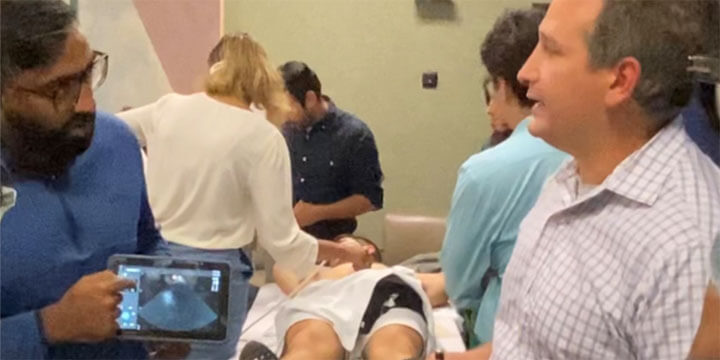Internal Medicine Curriculum
Program AIMS
The 3-year curriculum is designed to provide the clinical experiences needed to ensure that all residents can practice independently at the end of training and that those residents choosing to pursue additional fellowship training are best positioned to enter their fields as competitive candidates. The clinical learning environment that this training takes place within is one of support, kindness, and enthusiasm for the career development of each resident.
The 3-Year Program
PGY-1*
- 4 Blocks: Inpatient Medicine
- 3 Blocks: Ambulatory Medicine
- 1 Blocks: Geauga Medical ICU
- 1 Blocks: UH Cleveland Medical Center Medical ICU
- 1 Blocks: Elective
- 1 Block Cardio/Pulm
- 1 Block: Nights
- 1 Block: Vacation
PGY-2*
- 3 Blocks: Inpatient Medicine
- 3 Blocks: Ambulatory Medicine
- 2 Blocks: Geauga Medical ICU
- 1 Block: Neurology/ Gastroenterology
- 0.5 Block Emergency Medicine
- 1.5 Blocks: Elective
- 1 Block: Nights
- 1 Block: Vacation
PGY-3*
- 3 Blocks: Inpatient Medicine
- 3 Blocks: Ambulatory Medicine
- 2 Block: Geauga Medical ICU
- 3 Blocks: Elective
- 1 Block: Nights
- 1 Block Vacation
* 1 block = 4 week
Point of Care Ultrasound (POCUS)

With ever-increasing portability, coupled with decreasing cost, point-of-care-ultrasound (POCUS) is becoming increasingly incorporated into the practice of Internal Medicine. Previously used almost exclusively for the guidance of procedures, POCUS is also becoming more popular for its diagnostics applications. Recent surveys show that the majority of medical schools and IM residency training programs are looking to incorporate this skill set into their respective curricula.
At UH Geauga, we take POCUS seriously. We believe that it is the future of Internal Medicine, and we are dedicated to providing training to all of our residents, both procedural and diagnostic. Led by nationally-recognized leaders in the field, our residents are exposed to a longitudinal 3-year POCUS curriculum that covers both procedural and diagnostic applications. Residents will get the opportunity to attend POCUS workshops, round with ultrasound systems, and learn in real-time, on live patients how POCUS can be utilized at the bedside to increase diagnostic accuracy aid in treatment plan execution.
Leadership in Medical Education
As physicians, we are also all teachers. Whether we teach our patients about their health conditions, family members about the care of their loved ones, or trainees who will become the next generation of physicians, understanding some basic principles of medical education makes everyone better. For those residents who in addition feel that medical education will play a significant role in the post-graduate career, the UH Geauga IM program also offers a very unique opportunity.
Founded in 2016, the Leadership in Medical Education Collaborative (LME-C) is a group of like-minded trainees who are looking to develop a medical education skillset. These trainees come from different disciplines, but share a passion for medical education. To support their career goals, the LME-C is organized to provide education-specific training in topics such as adult learning, theory, curriculum development, scholarly dissemination, and educational techniques, among others that will be key in ensuring that after graduation these residents hit the ground running towards their career goals. In addition to dedicated didactic time, these residents are given opportunities to put their teaching into action both at the medical school and residency levels.


